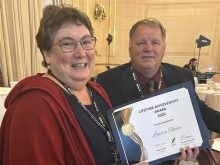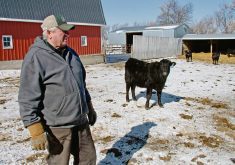University of Manitoba canola trailblazer Michael Eskin was formally inducted into the Canadian Agricultural Hall of Fame Nov. 2 in Toronto. The following article was written earlier this year following the announcement of the 2024 inductees.
Michael Eskin’s long career as a canola researcher has landed him a spot in the Canadian Agricultural Hall of Fame.
“I’ve been very lucky,” he said. “I’m originally from England, and I came to Canada in ’68, to the University of Manitoba. It was being at the right time, at the right place.”
Read Also

VIDEO: Manitoba’s Past Lane – Jan. 31
Manitoba, 1946 — Post-war rations for both people and cows: The latest look back at over a century of the Manitoba Co-operator
Eskin, along with forage crop researcher Bruce Coulman, former Semex CEO Paul Larmer and entomologist Charles Vincent, will be formally inducted Nov. 2 at the Royal Agricultural Winter Fair in Toronto.
“We are thrilled to honour their accomplishments in advancing cattle genetics, forage breeding, sustainable insect management and Canadian canola oil,” said Canadian Agricultural Hall of Fame chair Phil Boyd in a release. “As a key part of each of their professional careers, they have mentored future leaders — an equally vital contribution for the long-term sustainability of Canadian agriculture.”
Why it matters: Michael Eskin’s work improved canola’s value as a food oil and helped elevate the oilseed to one of the biggest crops on the Prairies.
The induction comes hot on the heels of Eskin’s welcome into the Manitoba Agricultural Hall of Fame last year, where he was praised for his years of mentorship and “pivotal role in transforming canola into the country’s most profitable food crop.”
He arrived at the U of M only a few years after plant breeder Baldur Stefansson started working with rapeseed genetics, developing what would one day become canola.
Erucic acid content was a problem in those early days, giving the oil an unpleasant odour and sharp taste. It wasn’t until 1974 that Stefansson successfully developed a variety of rapeseed with low erucic acid and other compounds responsible for the bad taste, and canola was born.
While fellow researchers Bruce McDonald and Vivian Bruce investigated the taste and nutritional content of canola oil and demonstrated that it was safe for human consumption, Eskin and Marion Vaisey-Genser focused on its performance, stability, shelf life and sensory qualities.
Eskin’s research over the years has focused on identifying enzymes responsible for breaking down fatty acids in canola, optimizing its use for frying and its stability across various food products, as well as improving its sensory appeal and preservation in food use.
“We had no idea of the impact that the work we were doing would have on the Canadian economy,” Eskin said. “That brings in about $30 billion a year to the Canadian economy.”
The fruits of his labour also marked a sea change in distribution of Canadian farm acres. Today, canola is the second-most planted crop in the country, behind only wheat.
“It was a completely new crop introduced to Canada,” Eskin said. “The ramifications of this affect not just the main [agricultural] industry, but the other subsidiary industries.”
Eskin has been integral in making canola into a crop that becomes a healthy food and a low-carbon biofuel, said Curtis Rempel, vice-president of crop production and innovation with the Canola Council of Canada.
“In terms of his contribution to canola and its contribution to the Canadian economy, he basically facilitated, verified and validated what the plant breeders can do, because you have to have somebody in all of the testing methodologies … as well as validating the performance attributes of both the oil and the meal,” said Rempel.
Eskin was a pioneer in effective and quick measurement of glucosinolates and uric acid, so that varieties can meet the definition of canola, Rempel added.
He’s now helping canola dig back into a non-food market: biofuels.
Biofuel has created considerable excitement in the canola sector. Earlier this year, Canadian Oilseed Processors Association executive director Chris Vervaet told attendees of a Winnipeg industry event that “the capacity of crush could grow from 11.3 million metric tonnes today to 18 million metric tonnes in three or four years,” due in no small part to biofuel demand.
Eskin’s work has helped set the stage for that boom, Rempel said.
“The next big thing is going to be … plant or vegetable oils that have a low carbon density for sustainability, and a lot of Michael’s work sets the groundwork for that kind of analysis.”
Eskin’s help to develop the next generation of researchers at the University of Manitoba has also enriched the Canadian agricultural landscape, Rempel added.
“The people who got to be his grad students had amazing careers because of his mentorship and also because of his reputation.”
Eskin was nominated for the national honour by Michel Aliani, acting associate dean at University of Manitoba’s department of food and human nutritional sciences.
“I have a very close relationship with (Eskin) in collaboration, research and everything and he has been amazing,” Aliani said. “He’s appreciated by the whole scientific community and by students, by professors.”
The industry boasts many talented scientists in the industry, he added, but it takes a special kind of person to leave the mark that Eskin has.
“You can find a lot of good scientists everywhere in every university, in any academic area. But finding someone who has dedicated 54 or 55 years in our department, already more than five decades, who is still coming in … that’s really telling.”
Now 82, Eskin has no plans to retire.
“If you end up doing something you love, and get paid for it, it’s just a bonus,” he said.
Eskin’s previous accolades include the Order of Canada, Order of Manitoba and awards from the Canadian Institute of Food Science and Technology, Institute of Food Technologists, and American Oil Chemists’ Society.
His textbook, “Biochemistry of Foods,” is held in high regard within the industry and last year he told the Co-operator that the publisher had approached him for a fourth edition.
















